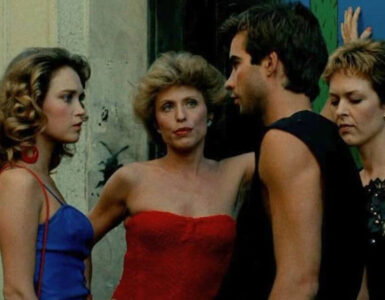When it comes to being proclaimed an auteur, one must walk a fine line. Throughout his long running career, director Wes Anderson has been lauded in art house circles as a modern day pop art auteur, blending a wholly singular style with a rather dense bit of family and outcast-centered substance. However, others have cited his works, including his later works like Life Aquatic and particularly The Darjeeling Limited, as being drenched in self indulgent pretention and nothing more than self parody.
Apparently the latter hasn’t had the chance to see Anderson’s latest outing, the sweet and loving ode to childhood romance, Moonrise Kingdom, because while the film is perfectly distilled Anderson in every possible way, it also feels to be yet another truly personal work from a director who has forced the viewer to bend to his style, instead of doing the opposite.
Starring a mixture of big time A-listers like Bruce Willis, Edward Norton, Bill Murray and Frances McDormand, along with a collection of new youngsters led by Jared Gilman and Kara Hayward, Moonrise follows a twosome who runs away from home, with the hopes of not only leaving their past lives behind them, but spending the rest of what remains with one another.
We meet Sam, an orphaned Khaki Scout and Suzy, a troubled young girl who would be right at home as the young version of Margot Tenenbaum, as our mid ‘˜60s set Romeo and Juliet. Both come from harsh roots, Sam is not the fondest apple of his foster parents who open the film by basically disowning him when his absence is revealed, and Suzy finds that her mother is having what appears to be some sort of affair with the local police chief. However, it’s these harsh roots that get to the core of what Anderson has, throughout his career, been trying to discuss.
Inherently, the film is about a young romance, finding two mature-beyond-their-years children taking their lot in life into their own hands, and forcing the world around them to allow their love to blossom. But with the film’s final act, one discovers Anderson’s deeper play here. A pending hurricane plays as the film’s grey cloud, hanging directly over the proceedings as if it were a pestering fly, buzzing around your head making its presence known every so often. Anderson, however, is not one to superfluously toss a McGuffin around his films. As a meteorological manifestation of the tumultuous lives of these young adults, we become privy to Anderson’s belief that the tougher the roots, the stronger the trees that grow out of them.
Our leads here are absolutely fantastic. Hayward and Gilman are breakthrough stars with their performances as Suzy and Sam respectively, as they, along with the rest of the child portion of the cast, give Anderson and co-writer Roman Coppola’s dialogue a really great sense of life that has seemed to be lacking from his otherwise regular cast members. Murray is fine here, but doesn’t truly come into his own until the film’s final act, and his main squeeze, McDormand, is equally odd.
The film thrives when it is focusing on the lives of Sam and Suzy, as they are singularly great, but together, prove to be one of the best young romances on screen in years. Bruce Willis is a revelation here, as he’s doing something he hasn’t been doing for a while, acting, and Edward Norton’s affable Scout Master Ward is a joy to watch, as it may be his most charming performance in years.
But the star here is Anderson. Opening the film with what is best described as an admission of the self-referential nature of his work, we are thrust into a world that is entirely Anderson’s. Featuring esoteric pop music ranging from folk tunes to his always existing French pop that you’ll be hard pressed to get out of your head, the film, top to bottom, is entirely his. Pitch perfect framing, snap quick pans, and earth toned cinematography, the director not only distills his entire sense of style and aesthetic into its most pure form, but he also does something most people could never have expected him to do, expand upon it.
Finishing the film with what is best described as a silent film action sequence but with dialogue, think it a roof top chase sequence shot like The Phantom Carriage, this may very well be the most mature, and experimental, directorial outing that we’ve yet seen from Anderson.
While his style will always have its detractors, the world is truly a better place for having a love letter to youthful love as wonderfully crafted and emotionally moving as what has been put to celluloid by director Wes Anderson. Always accused of being emotionally distant and visually cold, Anderson turns on his charm, warmth and child-like wonder for what may be his best film since The Royal Tenenbaums.






![Bergman Island (The Criterion Collection) [Blu-ray]](https://criterioncast.com/wp-content/uploads/2022/11/bergman-island-the-criterion-collection-blu-ray-400x496.jpg)
![This Is Not a Burial, It’s a Resurrection (The Criterion Collection) [Blu-ray]](https://criterioncast.com/wp-content/uploads/2022/11/this-is-not-a-burial-its-a-resurrection-the-criterion-collection-blu-ray-400x496.jpg)
![Lars von Trier's Europe Trilogy (The Criterion Collection) [The Element of Crime/Epidemic/Europa] [Blu-ray]](https://criterioncast.com/wp-content/uploads/2022/11/lars-von-triers-europe-trilogy-the-criterion-collection-the-element-of-400x496.jpg)
![Imitation of Life (The Criterion Collection) [Blu-ray]](https://criterioncast.com/wp-content/uploads/2022/11/imitation-of-life-the-criterion-collection-blu-ray-400x496.jpg)
![The Adventures of Baron Munchausen (The Criterion Collection) [4K UHD]](https://criterioncast.com/wp-content/uploads/2022/11/the-adventures-of-baron-munchausen-the-criterion-collection-4k-uhd-400x496.jpg)
![Cooley High [Criterion Collection] [Blu-ray] [1975]](https://criterioncast.com/wp-content/uploads/2022/11/cooley-high-criterion-collection-blu-ray-1975-400x496.jpg)